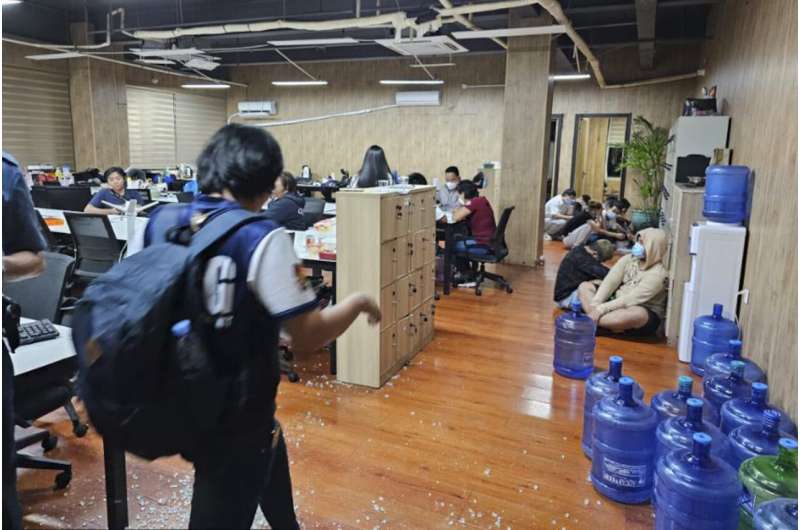This article has been reviewed according to Science X's editorial process and policies. Editors have highlighted the following attributes while ensuring the content's credibility:
fact-checked
reputable news agency
proofread
UN warns that hundreds of thousands in Southeast Asia have been roped into online scams

The U.N. human rights office says criminal gangs have forced hundreds of thousands of people in Southeast Asia into participating in unlawful online scam operations, including false romantic ploys, bogus investment pitches and illegal gambling schemes.
The Office of the U.N. High Commissioner for Human Rights, in a new report, cites "credible sources" that at least 120,000 people in strife-torn Myanmar and roughly 100,000 in Cambodia "may be held in situations where they are forced to carry out online scams."
The report sheds new light on cybercrime scams that have become a major issue in Asia, with many of the workers trapped in virtual slavery and forced to participate in scams targeting people over the internet.
Laos, the Philippines and Thailand were also cited among the main countries of destination or transit for tens of thousands of people. Criminal gangs have increasingly targeted migrants, and lure some victims by false recruitment—suggesting they are destined for real jobs.
The rights office, citing the "enormity" of the scam operations, said the exact impact in terms of people and revenues generated is hard to estimate because of their secrecy and gaps in governmental response, but it's believed to be in the billions of U.S. dollars every year.
Some victims have been subjected to torture, cruel punishments, sexual violence and arbitrary detention, among other crimes, it said.
Pia Oberoi, a senior advisor on migration and human rights for the Asia-Pacific region at the U.N. human rights office, described "two sets" of victims: people who get fleeced of large sums of money—sometimes their life savings—and people trafficked into working for the scammers, who themselves may lose money or face "stigma and shame" for the work they do.
Speaking to reporters in Geneva by video from Bangkok, Oberoi said many scams have their origins during the COVID-19 pandemic when lockdowns shut down casinos that were a key part of the economy along border zones and in Cambodia.
"What you saw really was criminal actors that were looking essentially to diversify their operations because their primary source of income had been reduced by these COVID lockdowns," she said. It also meant economic distress, which left "middle class, educated, technologically competent young people" out of work, so many got lured on false premises into working for the schemes.
The scams involve billions of dollars worth of revenues, the rights office said.
Oberoi also described the "so-called pig butchering scheme," often involving many people operating in a compound who target people who are led to believe "that they are speaking to somebody who is interested to be romantically involved with them."
"It's often men that are doing the scamming, pretending to be women," Oberoi said. If a target asks to see the woman, she said, "one of the few women in the compound is brought in to act as the model."
In June, Philippine police backed by commandos led a raid to rescue more than 2,700 workers from China, the Philippines, Vietnam, Indonesia and more than a dozen other countries who were allegedly swindled into working for fraudulent online gaming sites and other cybercrime groups.
In May, leaders from the Association of Southeast Asian Nations agreed in a summit in Indonesia to tighten border controls and law enforcement and broaden public education to fight criminal syndicates that traffic workers to other nations, where they are made to participate in online fraud.
© 2023 The Associated Press. All rights reserved. This material may not be published, broadcast, rewritten or redistributed without permission.




















